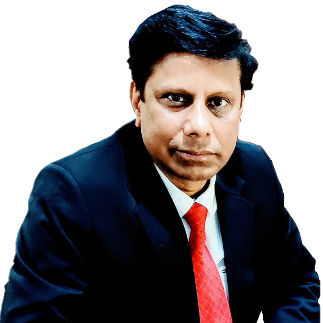Feeling Dizzy After Eating? A Guide to Causes and Management
Feeling dizzy or lightheaded after meals? Learn the common causes, from blood sugar changes to postprandial hypotension, and discover effective strategies to manage your symptoms and feel better.

Written by Dr. Shaik Abdul Kalam
Reviewed by Dr. J T Hema Pratima MBBS, Fellowship in Diabetes Mellitus
Last updated on 13th Jan, 2026

That satisfying meal you just enjoyed was supposed to leave you feeling full and energized. Instead, you’re dealing with a sudden, unsettling wave of dizziness, lightheadedness, or even nausea. If this sounds familiar, you're not alone. *Feeling dizzy after eating, a phenomenon known as postprandial dizziness, is a common but often confusing experience. It can range from a mild, fleeting sensation to a more severe episode that disrupts your day. This comprehensive guide will demystify why this happens, explore the various medical and lifestyle-related causes, and provide you with practical, actionable strategies to manage and prevent these uncomfortable episodes. We’ll dive into everything from blood sugar swings and blood pressure changes to specific dietary triggers, empowering you to take control of your wellbeing after every meal.
Quick Takeaways
Postprandial dizziness is often linked to a sudden drop in blood pressure (postprandial hypotension) or a rapid spike and fall in blood sugar (reactive hypoglycemia).
Common culprits include large, carbheavy meals, highglycemic foods, and excessive alcohol consumption.
Management strategies focus on dietary changes like eating smaller, more frequent meals and choosing low glycemic carbs paired with protein and fat.
Staying hydrated and moving gently after eating can significantly improve symptoms.
While often benign, persistent or severe dizziness after eating warrants a consultation with a healthcare professional to rule out underlying conditions.
Understanding the Body's Response to Eating
To understand why dizziness occurs, it's helpful to know what happens inside your body during digestion. After you eat, your body redirects a significant amount of blood flow to your stomach and intestines to aid in breaking down food and absorbing nutrients. This process, called splanchnic blood pooling, requires your heart to beat a little faster and your blood vessels to constrict in other areas to maintain stable blood pressure and ensure enough blood reaches your brain and extremities. When this complex circulatory adjustment doesn't happen seamlessly, it can result in a lack of adequate blood flow to the brain, leading to feelings of lightheadedness after meals.
Consult a General Physician for the best advice
Common Causes of Dizziness After Eating
Several factors can disrupt the body's delicate balance postmeal. Pinpointing the likely cause is the first step toward effective management.
Postprandial Hypotension (PPH)
This is one of the leading medical causes of dizziness after eating. Postprandial hypotension is defined as a drop in systolic blood pressure of at least 20 mm Hg within two hours of starting a meal.
How it works: For some individuals, particularly older adults, the autonomic nervous system (which controls involuntary functions like blood pressure) doesn't respond effectively to the blood flow demands of digestion. The blood vessels don't constrict enough to compensate, leading to an overall drop in blood pressure. This reduces cerebral perfusion pressure—literally, the pressure pushing blood to the brain—causing dizziness, weakness, and sometimes even fainting.
Who's at risk: It's most prevalent in older adults, especially those with high blood pressure, Parkinson's disease, or diabetes, which can affect nervous system function.
Reactive Hypoglycemia
While true hypoglycemia is often linked to diabetes medication, reactive hypoglycemia occurs in people without diabetes. It describes a sharp rise and subsequent rapid fall in blood sugar levels after a meal, typically within four hours.
How it works: Consuming a meal very high in refined carbohydrates and sugars (e.g., white bread, pasta, pastries, sugary drinks) causes a swift spike in blood glucose. The pancreas overcompensates by releasing a large amount of insulin. This excess insulin then drives blood sugar down too quickly and too low, leading to symptoms of low blood sugar after eating, which include dizziness, shaking, sweating, and anxiety.
Who's at risk: Individuals whose diets are consistently high in processed carbs may be more susceptible, though the exact mechanisms are not always clear.
Dietary Triggers and Meal Composition
Sometimes, the cause isn't a medical condition but rather the specific content and size of your meal.
Large Meals: A huge meal requires more blood for digestion, exacerbating the potential for blood pooling and a drop in blood pressure.
HighGlycemic Foods: As explained with reactive hypoglycemia, foods that cause a rapid sugar spike are prime suspects.
HighSodium Meals: In some sensitive individuals, a very salty meal can potentially affect fluid balance and blood pressure.
Alcohol with Meals: Alcohol is a vasodilator, meaning it causes blood vessels to relax and widen. This can amplify the blood pressure lowering effects of digestion, leading to pronounced dizziness.
Food Intolerances: In rare cases, dizziness can be part of a reaction to a specific food intolerance or sensitivity, often accompanied by other symptoms like bloating, headache, or fatigue.
Underlying Medical Conditions
In some instances, postprandial dizziness can be a symptom of a broader health issue that requires medical attention.
Diabetes: Both type 1 and type 2 diabetes can involve problems with blood sugar regulation and nerve damage (autonomic neuropathy) that interferes with blood pressure control.
Cardiovascular Issues: Heart conditions that affect its pumping efficiency can make it harder to compensate for the circulatory shifts during digestion.
Inner Ear Disorders: Conditions like Meniere's disease or benign paroxysmal positional vertigo (BPPV) cause vertigo (a spinning sensation) that can be mistakenly attributed to eating if an episode happens to occur after a meal.
Effective Strategies to Manage and Prevent PostMeal Dizziness
The good news is that most episodes of dizziness after eating can be effectively managed with simple dietary and lifestyle modifications.
1. Adjust Your Eating Habits
This is often the most impactful area for change.
Eat Smaller, More Frequent Meals: Instead of three large meals, opt for five or six smaller ones throughout the day. This places a smaller demand on your digestive and circulatory systems at any one time, preventing dramatic shifts.
Slow Down Your Eating: Chew thoroughly and eat mindfully. Gulping down food can cause you to swallow air (leading to bloating) and doesn't give your body time to gradually adjust to the digestive process.
Limit HighGlycemic Carbohydrates: Reduce your intake of refined carbs and sugars. Be mindful of white bread, white rice, potatoes, soda, and candy.
Balance Your Macros: Always pair carbohydrates with a source of protein and healthy fats. For example, have an apple with almond butter instead of just an apple, or wholewheat toast with avocado and an egg. Protein and fat slow down gastric emptying and the absorption of sugar, preventing sharp spikes and crashes.
Stay Hydrated: Drink plenty of water throughout the day. Adequate hydration increases blood volume, which helps stabilize blood pressure. Aim for a glass of water 1530 minutes before a meal.
2. Make Smart PostMeal Choices
What you do immediately after eating is just as important as what you eat.
Avoid Lying Down Immediately: Resist the urge to nap on the couch right after a big meal. Remaining upright helps gravity aid in digestion and blood flow.
Take a Gentle Walk: A slow, 1015 minute walk after eating can assist digestion and help your body regulate blood flow and blood sugar more effectively, preventing pooling and dizziness.
Avoid Sudden Movements: Stand up slowly from the table. Sudden changes in posture can compound any existing lightheadedness.
3. Consider Medical Intervention and Monitoring
If lifestyle changes aren't enough, it's time to seek professional help.
Consult a Doctor: If your symptoms are severe, frequent, or accompanied by chest pain, fainting, or vomiting, see a healthcare provider. They can help diagnose or rule out conditions like PPH, hypoglycemia, or diabetes.
Keep a Food and Symptom Diary: Track what you eat, the portion size, and any symptoms that follow. This can be invaluable for you and your doctor in identifying specific triggers.
Potential Medications: In cases of severe postprandial hypotension that doesn't respond to other measures, doctors may sometimes prescribe medications like acarbose (which slows carbohydrate absorption) or midodrine (a vasoconstrictor).
When to Seek Immediate Medical Attention?
While often harmless, dizziness can sometimes signal a more serious problem. Seek emergency care if your dizziness after eating is accompanied by:
Chest pain or pressure
Shortness of breath
Slurred speech or confusion
Numbness or weakness in the face or limbs
A rapid, irregular heartbeat
Loss of consciousness or fainting
Conclusion: Taking Control of Your PostMeal Wellness
Feeling dizzy after eating can be an alarming and uncomfortable experience, but it is rarely a cause for panic. In most cases, it's your body's way of signaling that it's struggling to manage the complex circulatory and metabolic changes demanded by digestion. By understanding the primary culprits—postprandial hypotension, reactive hypoglycemia, and simple dietary triggers—you are empowered to take action. Start with the foundational strategies: rethink your meal size and frequency, make smarter food choices by balancing your nutrients, and adopt gentle postmeal habits like walking. Listen to your body's cues and use a food diary to become a detective of your own health. If simple changes don't resolve the issue, or if your symptoms are severe, partnering with a doctor is the crucial next step. You don't have to accept postmeal dizziness as a normal part of life. With knowledge and a proactive approach, you can enjoy your meals in comfort and confidence.
Consult a General Physician for the best advice
Consult a General Physician for the best advice

Dr. Rajib Ghose
General Physician/ Internal Medicine Specialist
25 Years • MBBS
East Midnapore
VIVEKANANDA SEBA SADAN, East Midnapore

Dr Vinay Kumar A V
Nephrologist
8 Years • MBBS, MD - General Medicine, DM - Nephrology
Bilaspur
Apollo Hospitals Seepat Road, Bilaspur

Dr. Hariprasath J
General Physician/ Internal Medicine Specialist
19 Years • MD (Gen Med), FCCP, Dip (Diabetology, UK)
Chennai
Apollo First Med Hospitals P H Road, Chennai
(225+ Patients)

Dr. Ajay K Sinha
General Physician/ Internal Medicine Specialist
30 Years • MD, Internal Medicine
Delhi
Apollo Hospitals Indraprastha, Delhi
(200+ Patients)

Dr. Naresh
General Physician/ Internal Medicine Specialist
5 Years • MBBS, MD (General Medicine)
Mahbubnagar
SIMS HOSPITAL, Mahbubnagar
More articles from Dizziness
Frequently Asked Questions
1. What is the difference between dizziness from low blood pressure and low blood sugar?
While both can cause lightheadedness, low blood sugar (hypoglycemia) often comes with additional symptoms like shaking, sweating, intense hunger, and anxiety. Dizziness from low blood pressure (hypotension) is more likely to be accompanied by weakness, blurry vision, and a feeling you might faint, especially when standing up.
2. Can drinking water before a meal really help prevent dizziness?
Yes. Drinking a glass of water 1530 minutes before eating can help increase blood volume. This provides a better buffer for your body to maintain stable blood pressure when blood is diverted to your digestive system, reducing the risk of postprandial hypotension.
3. I often feel dizzy after breakfast. Why is that?
This is common. After a night of fasting, your body is often slightly dehydrated, and your blood sugar is at its lowest. Eating a breakfast high in simple carbs (like sugary cereal, toast with jam, or a pastry) can cause a rapid sugar spike and crash, leading to more dizziness after eating. Opt for a balanced breakfast with protein, fat, and complex carbs (e.g., eggs with wholewheat toast and avocado).
4. Are there specific foods I should avoid to prevent getting dizzy after meals?
The main foods to limit are those that cause rapid spikes in blood sugar. These include white bread, white rice and pasta, pastries, sugary desserts, soda, and fruit juices. Also, be cautious with large, high-sodium meals and consuming alcohol with your food.
5. Is feeling dizzy after eating a sign of diabetes?
It can be, but it's not always the case. In diabetes, dizziness can result from blood sugar that is too high (hyperglycemia) or, more commonly, too low (hypoglycemia) due to medication. It can also be a sign of autonomic neuropathy, a type of nerve damage that affects blood pressure control. If you have recurring episodes, especially with other symptoms like excessive thirst or urination, it's important to see a doctor for evaluation.

